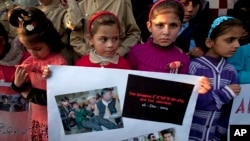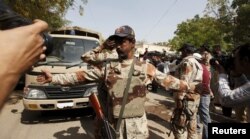Military courts in Pakistan have handed down death sentences to 310 people convicted of terrorism in the last four years, and 56 of them have been executed. Fifteen of the death penalties were approved by the military chief Sunday, according to an official announcement.
The army released the details as the country observed the fourth anniversary of the December 2014 massacre of more than 150 people, mostly children, at an army-run public school in the northwestern city of Peshawar.
The militant attack outraged Pakistanis and prompted the then parliament to permit the military to try civilians linked to terrorist groups or organizations instigating violence in the name of religion.
717 cases
The military courts have since received the cases of 717 people accused of terrorism from the civilian administration and concluded trials for 546 of them.
“Out of 310 sentenced to death, 56 terrorists have been executed after completion of legal process beyond military courts’ decisions, which included their appeal in superior civil courts and rejection of their mercy petition both by the army chief and the president of Pakistan,” the army said in its statement Sunday.
It added that executions of remaining 254 are pending completion of legal process in the civilian courts. It said that 234 people were awarded “rigorous imprisonment” of varied duration ranging from life imprisonment to a minimum duration of five years, and two accused were acquitted.
“Those who have been awarded death penalty included masterminds, executors and abettors/ facilitators, inter alia, of major terrorist incidents” in Pakistan, the military noted.
Convicts are allowed to challenge the sentences awarded by the military tribunals in Pakistani civilian courts, though none has been overturned to date.
Military courts under fire
Human rights groups remain critical of Pakistan’s military courts, saying the trials are not open to the public and do not meet international standards of justice.
Lawyers and families in appeal proceedings in civilian courts have questioned evidence in some cases and alleged their relatives were coerced into confession.
The Pakistan army and civilian officials reject the charges and maintain the legislation allowing the trials binds the special tribunals to conduct “fair and transparent” hearings.
Political parties have backed the military courts, noting Pakistan’s regular judicial system does not offer protection to witnesses. Moreover, judges and attorneys prosecuting suspected hardcore militants have complained of receiving death threats, or have come under attack.
Judicial reforms urged
Critics have long urged successive governments to carry out much needed judicial reforms to strengthen the civilian justice system in Pakistan.
The International Commission of Jurists (ICJ), advocating for justice and human rights, has denounced the military trials in Pakistan.
“The secret military trials of civilians charged with terrorism-related offenses are a continuing breach of Pakistan’s international human rights obligations,” the ICJ said in a recent statement.
“Pakistan should end the role of military courts in such cases, and instead strengthen the ability of ordinary courts and law enforcement to ensure investigations and trials that are both fair and effective, in line with its domestic law and international human rights obligations,” it said.
Intensified military operations since the school attack have also killed thousands of militants mainly linked to the Tehreek-e-Taliban Pakistan, commonly known as the Pakistani Taliban, which claimed responsibility for the massacre of schoolchildren.





